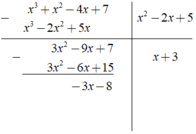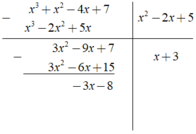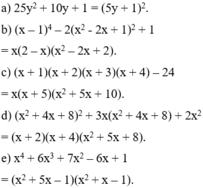
Hãy nhập câu hỏi của bạn vào đây, nếu là tài khoản VIP, bạn sẽ được ưu tiên trả lời.


a.
$x^2-y^2-2x+2y=(x^2-y^2)-(2x-2y)=(x-y)(x+y)-2(x-y)=(x-y)(x+y-2)$
b.
$x^2(x-1)+16(1-x)=x^2(x-1)-16(x-1)=(x-1)(x^2-16)=(x-1)(x-4)(x+4)$
c.
$x^2+4x-y^2+4=(x^2+4x+4)-y^2=(x+2)^2-y^2=(x+2-y)(x+2+y)$
d.
$x^3-3x^2-3x+1=(x^3+1)-(3x^2+3x)=(x+1)(x^2-x+1)-3x(x+1)$
$=(x+1)(x^2-4x+1)$
e.
$x^4+4y^4=(x^2)^2+(2y^2)^2+2.x^2.2y^2-4x^2y^2$
$=(x^2+2y^2)^2-(2xy)^2=(x^2+2y^2-2xy)(x^2+2y^2+2xy)$
f.
$x^4-13x^2+36=(x^4-4x^2)-(9x^2-36)$
$=x^2(x^2-4)-9(x^2-4)=(x^2-9)(x^2-4)=(x-3)(x+3)(x-2)(x+2)$
g.
$(x^2+x)^2+4x^2+4x-12=(x^2+x)^2+4(x^2+x)-12$
$=(x^2+x)^2-2(x^2+x)+6(x^2+x)-12$
$=(x^2+x)(x^2+x-2)+6(x^2+x-2)=(x^2+x-2)(x^2+x+6)$
$=[x(x-1)+2(x-1)](x^2+x+6)=(x-1)(x+2)(x^2+x+6)$
h.
$x^6+2x^5+x^4-2x^3-2x^2+1$
$=(x^6+2x^5+x^4)-(2x^3+2x^2)+1$
$=(x^3+x^2)^2-2(x^3+x^2)+1=(x^3+x^2-1)^2$

3: \(x^4-13x^2+36\)
\(=x^4-9x^2-4x^2+36\)
\(=\left(x^2-9\right)\left(x^2-4\right)\)
\(=\left(x-3\right)\left(x+3\right)\left(x-2\right)\left(x+2\right)\)
4: \(x^4+3x^2-2x+3\)
\(=x^4+x^3+3x^2-x^3-x^2-3x+x^2+x+3\)
\(=\left(x^2+x+3\right)\left(x^2-x+1\right)\)
5: \(x^4+2x^3+3x^2+2x+1\)
\(=x^4+x^3+x^2+x^3+x^2+x+x^2+x+1\)
\(=\left(x^2+x+1\right)^2\)

Chọn D.
x 4 + 8x = x( x 3 +8)= x( x 3 + 2 3 ) = x(x + 2)( x 2 − 2x + 4)

Bài 1:
a: \(=\dfrac{2x^4-8x^3+2x^2+2x^3-8x^2+2x+18x^2-72x+18+56x-15}{x^2-4x+1}\)
\(=2x^2+2x+18+\dfrac{56x-15}{x^2-4x+1}\)

Ta có phép chia

Dựa vào kết quả của phép chia trên, ta có đa thức dư là - 3x - 8.
Chọn đáp án B.

Ta có phép chia

Dựa vào kết quả của phép chia trên,, ta có đa thức dư là - 3x - 8.
Chọn đáp án B.

Bài 13:
1: \(A=-x^2+4x+3\)
\(=-\left(x^2-4x-3\right)=-\left(x^2-4x+4-7\right)\)
\(=-\left(x-2\right)^2+7\le7\)
Dấu '=' xảy ra khi x=2
2: \(B=-\left(x^2-6x+11\right)\)
\(=-\left(x-3\right)^2-2\le-2\)
Dấu '=' xảy ra khi x=3

\(\left(3x^2-2x+3\right):\left(x^2+1\right)\\ =\left[3\left(x^2+1\right)-2x\right]:\left(x^2+1\right)\\ =3\left(\text{dư }-2x\right)\\ \left(3x^2-4x+4\right):\left(x^2+2\right)\\ =\left(3x^2+6-4x-2\right):\left(x^2+2\right)\\ =\left[3\left(x^2+2\right)-4x-2\right]:\left(x^2+2\right)\\ =3\left(\text{dư }-4x-2\right)\)